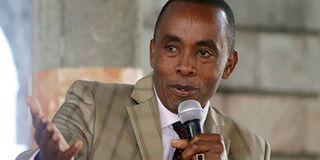Revenue sharing scheme shapes census debate

Kiambu Senator Kimani Wamatangi. He wants the formula on revenue sharing revised to advance fairness. PHOTO | FILE | NATION MEDIA GROUP
What you need to know:
- Mr Wamatangi argues that credible census will give correct population size in the regions and enable CRA to come up with a fair formula to allocate funds equitably.
- Gatundu South MP Moses Kuria vows to oppose the proposed formula because it is unfair and based on cooked 2009 census figures which are outdated and incorrect.
On April 22, 2016, Kiambu Senator Kimani Wamatangi filed a petition at the Milimani High Court challenging the formula employed by the Commission on Revenue Allocation to share-out funds to counties on grounds that it was unfair to some regions.
Through his lawyer Kibe Mungai, the senator then told Justice Joseph Onguto that the commission had failed to recommend a proper formula for the allocation of funds to counties and demanded for a review to ensure equity.
Then the matter which was meant to benefit mostly Mount Kenya counties was inexplicably given a wide berth by the region’s leaders, even as the CRA and lawmakers from other regions fought Mr Wamatangi’s push which he has sustained.
CENSUS
The senator has been pushing to have funds disbursed based on population, and to achieve this, he has been demanding a fresh review of the formula to be done after a credible census is concluded, considering population has been the main parameter in the computation of the revenue sharing formula.
The lawmaker argues that credible census will give correct population size in the regions and enable the Dr Jane Kiringai-led commission to come up with a fair formula to allocate funds equitably according to their people and needs.
Three years later, the issue of the review of the formula has become thorny and now threatens to cause divisions, with leaders from across the country charged by the upcoming census, now pushing to ensure their respective counties get more funds.
FAIRNESS
Top on the agenda in the review debate is the upcoming census which the leaders want conducted in a credible manner to ensure that counties are allocated money based on the number of people they host.
Presently, the statistics relied upon are those that were collected during the 2009 census, which central Kenya leaders say do not reflect the actual numbers on the ground, hence promoting unfairness.
They argue that if not addressed, developed counties will be marginalised in the allocation of resources.
The leaders want population to be the main parameter in the revenue sharing formula, but lamented that figures relied upon are erroneous since CRA relies on the 2009 census which leaders say is outdated and was manipulated to the disadvantage of populated regions.
For instance, Mr Wamatangi said Kiambu has been getting its allocation based on the 2009 census which set the population at 1.6 million yet the county’s current population is over three million people.
ADULTERATED
As per the CRA’s draft proposal, Kiambu will get Sh10.05 billion up from Sh9.4 billion in the current financial year but local leaders said the increase is a drop in the ocean since it will only get Sh600 million.
After the recurrent expenditure is deducted, Mr Wamatangi says the county will have less than Sh2 billion for development while some less populated counties get Sh5 billion development cash.
“Monies are allocated to regions so that they can benefit the people. Even when talking about the poverty parameters, the allocation is done so that it can benefit people … we should first conclude the census so that the commission can do the review based on the correct population,” Mr Wamatangi said.
Gatundu South MP Moses Kuria vows to oppose the proposed formula because it is unfair and based on cooked 2009 census figures which are outdated and incorrect.
During a joint parliamentary group meeting in Naivasha last year, Mount Kenya leaders in a communiqué read by nominated MP Cecily Mbarire, highlighted revenue sharing formula as one of the issues they want addressed by the government.
“Mount Kenya region contributes up to 60 percent of the country’s GDP yet only 20 percent is ploughed back to its people.
"We therefore call upon the Commission on Revenue Allocation, Parliament and other relevant agencies to ensure the region gets its fair share of resources when it comes to development and implementation of the second generation formulae,” the communiqué read.
DEVOLUTION
Leaders from the coast region led by governors Hassan Joho (Mombasa) and Amason Kingi (Kilifi) and those from Kenya’s northern frontier counties led by Ali Roba (Mandera) have also described the proposed formula as unfair, and a credible census is also their playing card.
“There will be a drop from Sh7 billion to Sh6 billion while Nairobi gets Sh17 billion; how do you justify that?” Mr Joho asked.
“We will not allow that; and if we have to go to court or use political means, then we will to stop this move,” he said, adding that the formula will kill devolution.
Mr Roba - who is also the Frontier Counties Development Council - aid the arid and semi-arid counties will lose close to Sh10 billion per year if the new formula is adopted, noting that it will slash up to Sh100 billion from their allocations.
CREDIBILITY
Pastoralists Parliamentary Group secretary-general and Isiolo Woman Rep Rehema Dida acknowledged that census will guarantee equitable distribution, but said the use of a biometric system which is being rooted by central Kenya leaders should not apply, saying it will disfranchise them.
The leaders, who singled out Mr Kuria, said their region has more numbers than central Kenya and called for a credible census.
“The coming census must be done in a credible way, with the inclusion of international observers, and results transmitted transparently,” she said.





